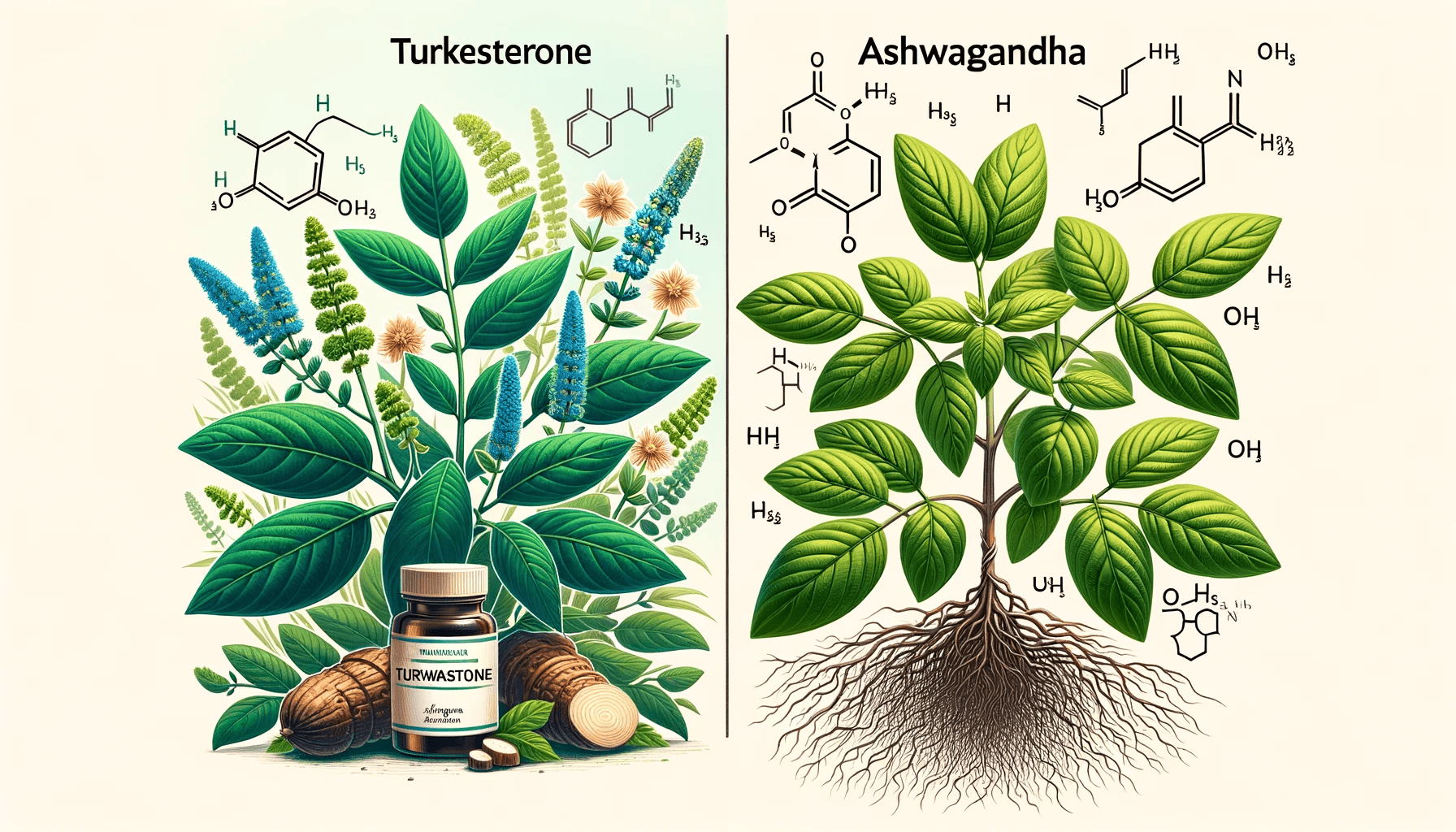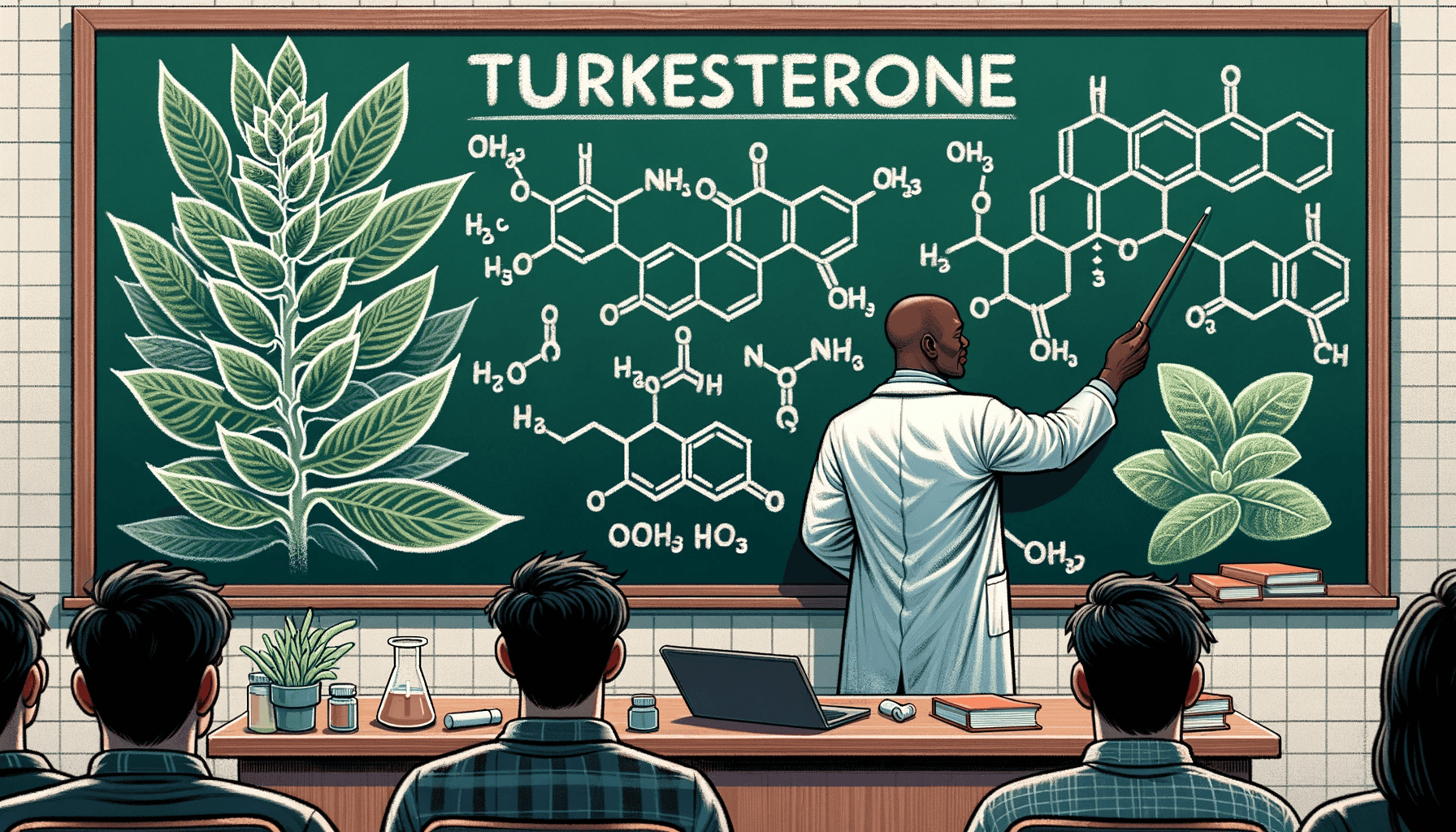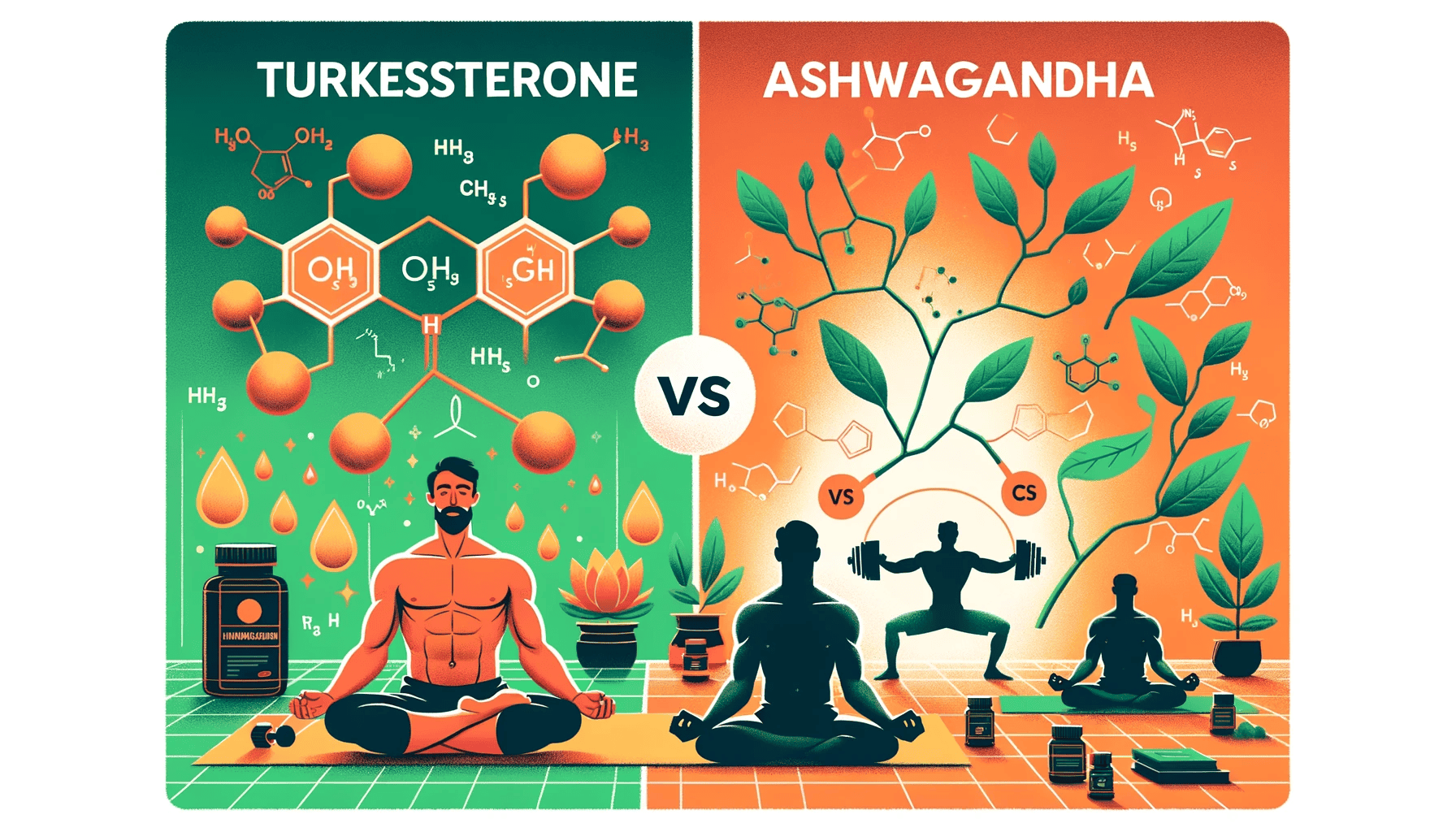
In natural supplements that promise to elevate performance, Ashwagandha and Turkesterone often emerge as top natural choices.
But how do these two compare in various facets?
Let's delve into a detailed comparison to help you decide which one to go with...
Turkesterone and Ashwagandha are both heralded for their performance-enhancing benefits, yet they diverge in their primary effects; Turkesterone is primarily sought after for its muscle-building potential, while Ashwagandha is prized for its stress-reducing and testosterone-boosting properties.
The choice between them hinges on whether one's priority is to amplify physical gains or to bolster overall well-being and hormonal balance.

Ashwagandha is an ancient herb, deeply rooted in traditional medicine for millennia.
It's derived from the Withania somnifera plant, native to India and North Africa.
Turkesterone, on the other hand, is extracted from the Ajuga turkestanica plant, a species native to Central Asia, and is classified as a phytoecdysteroid.
Ashwagandha operates by reducing cortisol levels, the body's primary stress hormone.
By doing so, not only bolsters mental well-being but also enhances athletic performance.
Research has shown that diminished cortisol levels can lead to heightened focus and energy during workouts.
Turkesterone takes a distinct approach.
It's geared towards amplifying protein synthesis in the body, a pivotal process for muscle growth and recovery.
This study underscores its efficacy in this domain.

With Ashwagandha, you're looking at a spectrum of benefits.
It's renowned for mitigating stress and anxiety, sharpening cognitive functions, and enhancing sleep quality.
Moreover, it has been shown to augment muscle strength, endurance, and even testosterone levels.
Turkesterone, in contrast, has a more singular focus.
It's tailored for athletic performance enhancement.
It aids in muscle mass augmentation, trims recovery time, and provides a palpable boost to energy levels.
Its role in increasing muscle mass and expediting recovery is supported by scientific evidence.
Like all substances, Ashwagandha and Turkesterone come with their set of caveats.
While Ashwagandha is generally benign, it might induce some digestive discomfort in certain individuals.
It's also known to interact with specific medications, making a consultation with a healthcare provider essential.
Turkesterone's side effect profile is less clear due to limited human research.
For Ashwagandha, dosages can range, but a common recommendation oscillates between 300-2000mg daily.
Turkesterone's dosage guidelines are more straightforward, typically suggesting 100-1000mg daily.
As always, starting on the lower end and seeking personalized advice from a healthcare provider is prudent.
Ashwagandha:
For millennia, Ashwagandha has been a staple in Ayurvedic healing, revered for its rejuvenating powers.
Its name, symbolizing the strength of a horse, hints at its traditional use to invigorate and fortify the body.
Turkesterone:
Turkesterone's journey from insect and plant compound to a muscle-building supplement is a modern tale of scientific discovery.

Ashwagandha, a cornerstone of Ayurvedic medicine, has been used for over 3,000 years to relieve stress, increase energy levels, and improve concentration.
Here's a look at its pros and cons based on research.
Pros:
Cons:

Turkesterone is a naturally occurring ecdysteroid found in some plants and insects, touted for its muscle-building benefits.
Here's what the research says about its advantages and potential drawbacks.
Pros:
Cons:
In conclusion, both Ashwagandha and Turkesterone offer unique benefits catering to different health and fitness goals.
It's essential to weigh these pros and cons, consider personal health conditions, and consult a healthcare provider before incorporating them into your routine.
When it comes to supplements, value is not just in the price tag but the benefits per buck.
Ashwagandha: At about $30 per bottle, Ashwagandha is a budget-friendly powerhouse.
Turkesterone: Turkesterone, at $60, is for those targeting muscle growth, despite its higher cost.
Choosing between Ashwagandha and Turkesterone is a balance of personal health goals and financial comfort.
Each has its merits, steeped in history or science, and the decision ultimately aligns with what you value most.

When Ashwagandha and Turkesterone are taken in tandem, they may offer complementary benefits that enhance overall well-being and physical performance.
Here's a breakdown of the potential synergistic outcomes:
The possible outcomes of combining these two supplements could be quite promising.
Still, it's important to note that everyone's body reacts differently, and what works for one person may not work for another.
It's always recommended to consult with a healthcare provider before starting any new supplement regimen.
Ashwagandha enjoys a robust body of research underscoring its benefits, from stress alleviation to muscle strength enhancement.
Turkesterone, while promising, is still in its nascent stages of human research.
Most existing studies are either animal-based or in vitro, making their efficacy less concrete.
Ashwagandha is the jack-of-all-trades in the supplement world.
From stress management to muscle fortification, it's got you covered.
Turkesterone, however, is laser-focused on muscle growth and athletic performance.
Ashwagandha is generally friendly with other supplements.
However, if you're on medication, it's imperative to have a dialogue with your doctor.
Turkesterone's interaction profile is less defined, so keeping your healthcare provider informed is a wise move.
Ashwagandha has been consumed for ages and is deemed safe for prolonged use.
Turkesterone, given its limited research, remains an enigma in this regard.
It's advisable to use it in cycles and always under medical supervision.

Both Ashwagandha and Turkesterone are gender-neutral and suitable for men and women alike.
However, Ashwagandha's hormonal effects make it less ideal for pregnant or breastfeeding women.
Does Turkesterone help build muscle?
Absolutely, Turkesterone is renowned for its ability to enhance protein synthesis, which is essential for muscle growth, making it a popular choice among those looking to increase muscle mass.
Can Ashwagandha improve workout performance?
Indeed, Ashwagandha has been shown to boost endurance and strength, reduce stress and anxiety, and enhance muscle recovery, contributing to better workout performance overall.
Is Turkesterone a steroid?
Turkesterone is classified as an ecdysteroid, which is a natural compound that shares some similarities with human steroids but is not a controlled substance and is considered safe and legal for use in dietary supplements.
How does Ashwagandha affect testosterone levels?
Research indicates that Ashwagandha may naturally increase testosterone levels, particularly in men, contributing to improved muscle strength and recovery.
Are there any side effects to taking Turkesterone?
While Turkesterone is generally considered safe, the research on its long-term effects is limited, and it's always wise to consult with a healthcare provider before starting any new supplement.
Can Ashwagandha help with weight loss?
Ashwagandha may indirectly support weight loss by reducing stress and cortisol levels, often associated with weight gain, especially in the abdominal area.
How long does it take for Turkesterone to show effects?
The time frame can vary, but some users report noticing benefits within a few weeks of consistent use, with optimal results often observed with longer-term use.
Can Ashwagandha and Turkesterone be taken together?
Yes, they can be taken together, and some suggest that their combined effects on stress, testosterone, and muscle synthesis may complement each other; however, it's important to consult a healthcare provider for personalized advice.
What is the recommended dosage for Turkesterone?
Dosage recommendations can vary, but most products suggest a range that aligns with the dosages used in scientific studies, typically around 500 mg per day.
Does Ashwagandha have any interactions with other medications?
Ashwagandha can interact with certain medications, such as those for thyroid, blood sugar, and blood pressure, so it's crucial to discuss with a healthcare provider before starting it, especially if you are on medication.

Navigating the natural supplement terrain can be a transformative journey.
Enhance your vitality and hormonal balance with natural testosterone boosters like Tongkat Ali, and compare its benefits to those of libido-enhancing Fenugreek.
Athletes seeking to bolster their performance may find the Tongkat Ali and Fadogia Agrestis synergy particularly compelling for muscle strength and endurance.
For muscle growth, the anabolic properties of Turkesterone are often juxtaposed with the muscle-supporting Epicatechin found in dark chocolate.
The debate on natural supplements versus steroids is ongoing, with Tongkat Ali emerging as a natural, safer alternative to conventional steroids.
Moreover, the stress-reducing benefits of Ashwagandha can indirectly support muscle function and recovery, highlighting the importance of managing stress for overall physical health.
For a deeper understanding of these supplements and their potential interplay with your goals, explore the detailed articles above.
Make informed decisions with our comprehensive guides to optimize your supplement strategy.
When it comes to enhancing your fitness regimen, both Turkesterone and Ashwagandha stand out, but for different reasons.
Turkesterone is emerging as a promising agent for muscle synthesis and performance enhancement, though more human studies are needed to fully understand its impact.
Ashwagandha, on the other hand, has a well-established history of reducing stress and potentially boosting testosterone, which can indirectly contribute to muscle growth and recovery.
The choice between the two should be informed by your specific health goals, potential sensitivity to supplements, and a preference for either immediate performance enhancement or long-term stress management and hormonal balance.
Always consider consulting with a healthcare professional before adding any new supplement to your routine, especially if you have underlying health conditions or are taking other medications.
Ultimately, the integration of either supplement into your lifestyle should be a thoughtful decision, complemented by a balanced diet, regular exercise, and adequate rest for optimal results.
Useful Links
 About FitFrek
About FitFrekFitFrek operates as an independent platform, offering comprehensive workouts, programs, routines, guides, and unbiased reviews to accelerate your progress. We pride ourselves on our honesty, delivering straightforward and candid insights. FitFrek does not offer medical advice, diagnosis, or treatment services.